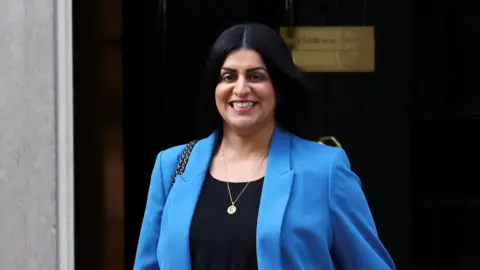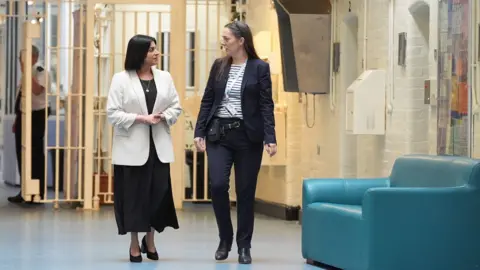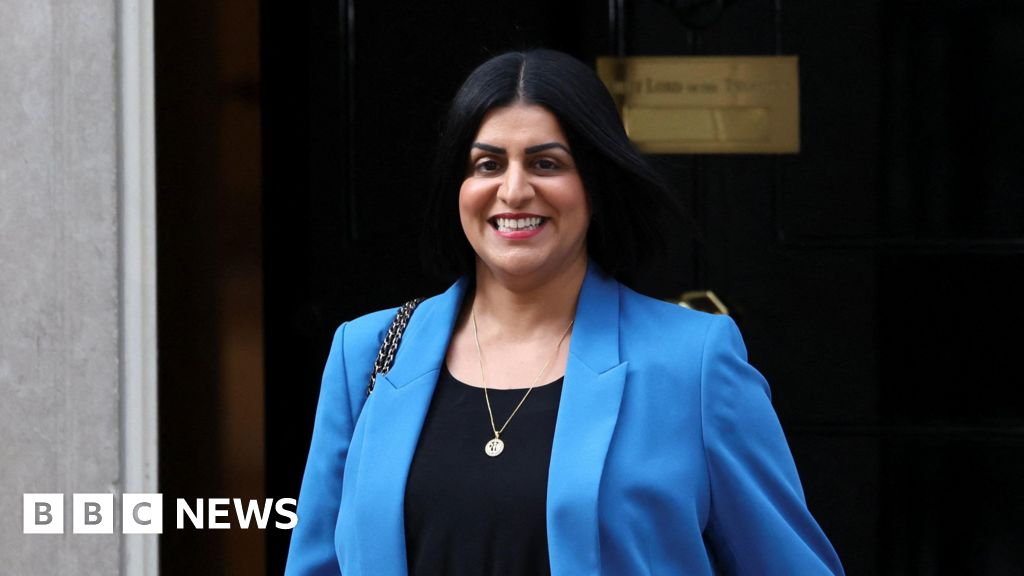Henry ZeffmanChief political correspondent
 Reuters
ReutersLooking at Sir Keir Starmer’s cabinet reshuffle it appears that he came to believe that he had all the right ministers at the cabinet table – just sitting in the wrong chairs.
The most significant change is the appointment of Shabana Mahmood as home secretary, which is intended as a clear signal that dealing with illegal immigration and asylum is one of the government’s biggest priorities.
That was the former Home Secretary Yvette Cooper’s view too, but there was a sense among some – not all – at the top of government that she was moving too slowly to meet public opinion.
There was particular frustration at Reform UK’s ability to drive the narrative on the issue over the summer even when the government had achievements to herald, including its “one in one out” agreement with France.
Mahmood has a reputation among Labour MPs as (relatively-speaking, in Labour terms) a hardliner on immigration.
“She’s really right-wing on this stuff,” one Labour figure who knows her well said.
From this person it was a compliment; from others in the Labour movement who are anxious about losing votes to the Greens and others on the left, it would not be.
In practical terms, though, what different policies will Mahmood pursue? That’s not so clear.
At the weekend John Healey, the defence secretary, said the government was looking at expanding the use of military sites to house asylum seekers instead of hotels.
That was in the works before the reshuffle. It may be that Mahmood seeks to accelerate the timetable for closing hotels.
Sir Keir has said that he wants to close them all before the next general election though he alluded in an interview with BBC Radio 5 Live last week to bringing that deadline forward.
Then there is the European Convention on Human Rights (ECHR), from which both Reform UK and increasingly the Conservatives say the UK must withdraw to make it easier to deport illegal immigrants.
Cooper was looking at ways to change UK law to make clearer to judges here the way in which the government believes the convention should be interpreted.
Mahmood may want to go further but it is hard to see how that would be possible given Lord Hermer, who remains in post as attorney general, not to mention the prime minister himself, are both ardently opposed to withdrawal.
We may not need to wait long to find out what Mahmood’s new direction will be. Only a week after taking office as justice secretary last year, she announced plans to release thousands of prisoners earlier than planned to avoid what she called “total collapse” of the prison system.
Her handling of prison overcrowding, especially her willingness to grasp the nettle so early on, has been frequently compared favourably by Labour MPs to other cabinet ministers who were seen as taking too long to work out how they wanted to deal with their portfolios.
One ally of Mahmood told the BBC: “She knows that time is of the essence. She didn’t take long to take big decisions at the Ministry of Justice, and she doesn’t tend to hang about.”
 PA Media
PA MediaOne of the biggest changes might come in rhetoric and communication style.
Cooper was shadow home secretary for seven years in two stints and also spent five years as chairwoman of the home affairs select committee. Some in Labour pushing for a harder line on immigration occasionally complained that her deep knowledge of the issues involved made her public comments too nuanced to embody public dissatisfaction.
Mahmood is likely to go another way. On Sunday she described the small boat crossings as “utterly unacceptable” and vowed to act against “vile people smugglers”.
It is also worth noting that the two junior ministers working with Cooper on immigration have been moved out the Home Office too.
Mahmood, 44, has been an MP for 15 years representing a constituency in Birmingham, but it is only in the past two years that she has moved into front-line, high-profile roles.
After spending her first five years in Parliament in a range of junior shadow ministerial portfolios, she co-chaired Cooper’s unsuccessful leadership campaign in 2015. She then refused to serve under Jeremy Corbyn, instead dedicating her time during his leadership to fighting those on Labour’s left-wing from a position on Labour’s national executive committee, to which she was elected by Labour MPs.
In 2021, at the lowest ebb of Sir Keir’s leadership, she was brought into the shadow cabinet to take charge of Labour’s election campaign infrastructure. Even in that job, though, she was pushing her party to get over what she called its “queasiness” about talking tough on immigration.
In an interview with the Times in 2023, she said: “In the commentariat, among very politically engaged people, there’s a sort of assumption about who is motivated by immigration as an electoral issue.
“My constituency experience is that, actually, that’s not got very much to do with race. I represent a very diverse constituency that’s 70% non-white, and immigration comes up as an issue that my voters who are black or Asian and from other ethnic minorities want to talk about.”
That is an argument you can be sure she will be making as home secretary in the coming weeks.
Whether she can address those concerns will determine not just her political fortunes but those of this government and prime minister too.


